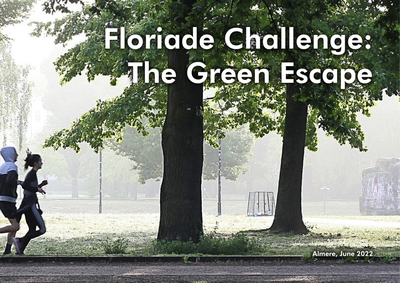In anderhalve minuut legt deze animatie je uit wat de Food Boost Challenge is. Een challenge mét, dóór en vóór jongeren, geholpen door onderwijs, en partners uit het maatschappelijk veld en bedrijfsleven. Want jongeren weten het beste wat hen helpt om gezondere keuzes te maken, als het gaat om voedselkeuzes. En dus ook welke veranderingen in de eetomgeving nodig zijn om makkelijker te kiezen voor gezonder, meer groente en fruit, meer volkoren en meer water in plaats van gesuikerde dranken. En onderwijs en partners uit maatschappelijk veld en bedrijfsleven kunnen de jongeren helpen bij de uitwerking van idee naar prototype en pilot test onder de doelgroep. Kortom een super leuke, leerzame en relevante challenge!
YOUTUBE

In honours programmes, teachers face the task of designing courses in which students feel challenged and learn from accomplishing demanding assignments. The aim of this study was to investigate students’ and teachers’ perceptions of challenge and learning in an honours programme. From 2016 to 2019, students and teachers rated the learning activities during the programme and explained their ratings. The results showed that in the first two years, teachers estimated challenge and learning significantly higher than the students did. However, both students and teachers viewed the tasks as the factor with the strongest impact on challenge and learning. In the first year, students also identified group dynamics as challenging and a source for learning. Enhancing task complexity and supporting group dynamics are the main factors to adjust the level of challenge in an honours programme. Monitoring students’ and teachers’ perceptions can help to adapt the programme to improve students’ learning.
MULTIFILE

Almere is a green city where the greenery extends into the centre through a framework of nature, forests, parks and canals. With this green environment, Almere fulfils an important condition for a liveable city, where it is pleasant to live and work. An important goal for the municipality is to challenge its residents to develop a healthy lifestyle by using that green framework.But what really motivates Almeerders to go outside to exercise, enjoy the surroundings and meet each other? Are there sufficient green meeting or sports facilities nearby? Could the routes that connect the living and working environment with the larger parks or forests be better designed? And can those routes simultaneously contribute to climate adaptation?With the Green Escape Challenge, we invited students and young professionals to work on these assignments together.
DOCUMENT

In Nederland heeft 22% van de lager en middelbaar opgeleiden tussen 18 en 34 jaar betaalproblemen, zo blijkt uit onderzoek van GGN (2014). De Stichting Weet Wat je Besteedt (WWJB) heeft daarom de Budget Challenge ontwikkeld, gericht op het mbo. In de Budget Challenge worden twee workhops gegeven, onder andere over het kostenbewust gebruik van de mobiele telefoon. De uitkomsten wijzen op een positieve impact van de Budget Challenge ten aanzien van de financiële zelfredzaamheid van studenten van het mbo. De studenten hebben na afloop meer inzicht in de oorzaken, gevolgen en aanpak van financiële problemen. De Budget Challenge lijkt minder impact te hebben op het mobieletelefoongedrag van de studenten.
DOCUMENT

Herman Peppelenbos, lector Groene Gezondheid spreekt over Consumer Challenge tijdens zijn HAS Talk.
LINK
Olga Haenen, Lector INVIS (Nieuwe eiwitten, insecten en vis, gezond, duurzaam en veilig) spreekt over de Health Challenge tijdens haar HAS Talk.
LINK
P.J. Beers, Lector Nieuwe Business Modellen voor Landbouw- en Voedseltransitie spreekt over de Circular Challenge en Transitie naar circulaire landbouw- en voedselsystemen tijdens zijn HAS Talk.
LINK
Lector Antien Zuidberg van het lectoraat Design Methoden in Food spreekt over the Consumer Challenge!
LINK
Lector Erwin van Woudenberg van het lectoraat Innovatief ondernemen met de Natuur spreekt over The Start-up Challenge.
LINK
Maritime Spatial Planning (MSP) is a politically guided and stakeholder-driven process involving a range of actors (i.e., planners, stakeholders, scientists, and citizens). Theories of boundary objects offer a lens to understand how actors, in the context of decision and policy-making in organizations, can coordinate without consensus. This seems particularly relevant when institutions and communities are relatively young, and the body of knowledge is fragmented and fluid, such as in the case of MSP. A key question is whether, and how boundary objects can be intentionally designed and used to facilitate social and policy learning in such communities. In this research, the focus is on the use of the MSP Challenge serious games as a boundary object to facilitate learning in ‘Communities of Practice’ (CoP) around MSP. Data were collected through questionnaires of 62 MSP Challenge workshops between 2016 and 2020 with more than 1100 participants. Additionally, 33 interviews with key stakeholders were conducted. The findings show that the MSP Challenge is widely used for various goals and in various settings and that they are interpreted differently by different users. The success of the MSP Challenge relies on the boundary space in which it is implemented, taking into account discrepancies in learning due to variations in the backgrounds and attitudes of the participants towards the object, the activity, and the setting in which it is deployed.
MULTIFILE